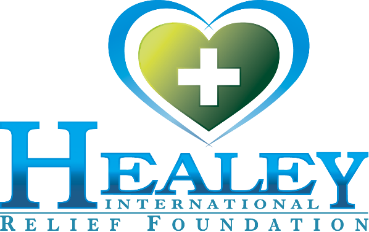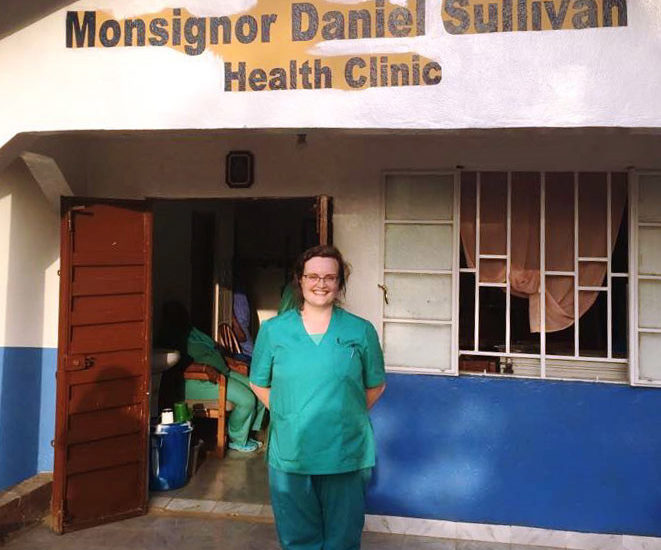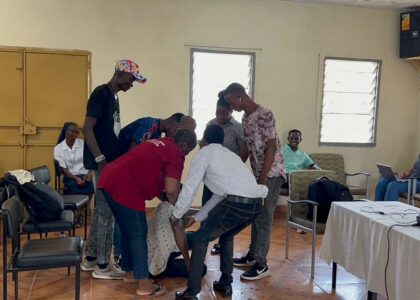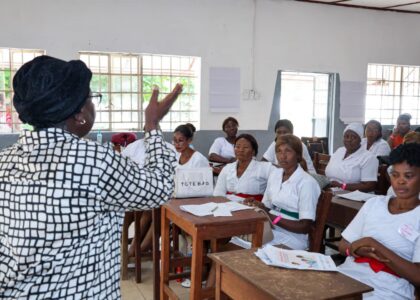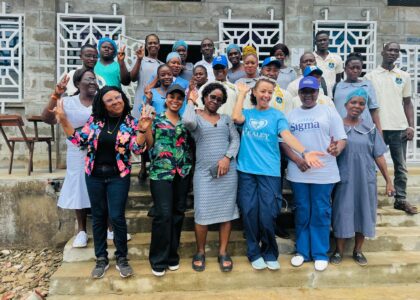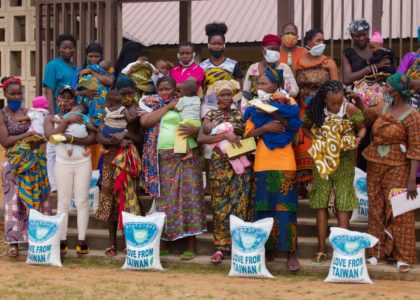The country of Sierra Leone has made undeniable progress in healthcare with better practices in place and implementing important healthcare staff, such as the Community Health Workers. Capacity building of the healthcare staff is one of the most critical components to strengthening these healthcare systems. Fortunately, for the past two years, Dr. Robin Muller has traveled to Sierra Leone to work and train staff at several facilities in our Charity Health Network, originally having sought out HealeyIRF, looking for international experience before beginning her residency in the US.
Dr. Muller is currently working at the West Virginia University, Family Medicine, Rural Program, but still eager to help HealeyIRF in any way she can, including answering some questions for our “What the Health?” series.
What sparked your interest to work in Sierra Leone?
I was looking for international experiences. I did extensive research online for organizations that worked with hospitals in countries with limited resources. I found HealeyIRF and was impressed  with their work in Sierra Leone, especially their investment in native Sierra Leonean healthcare workers. I emailed and was connected to Br. Michael, the Hospital Manager of St. John of God Hospital. This hospital suffered greatly during the Ebola crisis and lost many critical staff. They care for patients from all over Western Africa. Their obstetrics and pediatrics units have saved the lives of thousands of women and neonates. They host a German team of orthopedic surgeons twice yearly who were even able to perform a hip replacement while I was there!
with their work in Sierra Leone, especially their investment in native Sierra Leonean healthcare workers. I emailed and was connected to Br. Michael, the Hospital Manager of St. John of God Hospital. This hospital suffered greatly during the Ebola crisis and lost many critical staff. They care for patients from all over Western Africa. Their obstetrics and pediatrics units have saved the lives of thousands of women and neonates. They host a German team of orthopedic surgeons twice yearly who were even able to perform a hip replacement while I was there!
Do you find there to be many challenges or setbacks working in healthcare in Sierra Leone?
The biggest set backs are access to basic supplies like gloves, IV supplies, and electricity. There were many donations after the Ebola outbreak, but because of fear that their currently suppliers may eventually stop providing supplies and storage limitations, health care workers at times were hesitant to use disposable personal protective equipment even after just surviving this recent epidemic. Many patients come in requiring basic fluid resuscitation, but patients must pay for every IV needle used an attempt to get access. Sometimes patients could not even afford to pay for a medical book (patient chart to communicate with other doctors) and would not be able to get access to see a doctor. The other major issue was receiving donations from other countries. The donated equipment would occasionally not be compatible with existing equipment or, if broken, there was no one able to repair the equipment or the supplies were not available. This was a major setback as oxygen concentrators are critical for supportive care and many of them would at times some are donated come broken or would break and there was no one trained to fix them. The electricity would also go in and out during surgeries, although rarely, and the cost of running the generators at night was often too high to justify giving oxygen in the ED overnight. All of this being said the staff and doctors worked around these limitations brilliantly. The ED nurses in particular were very resourceful.
How could you best describe your experience working in Sierra Leone?

There were so many wonderful experiences that will stand out to me. There were so many times when I truly thought that a child who had come in with malaria was going to die, but she would be jumping on the bed in less than 8 hours. That is what would get me jumping up out of bed in the morning! I was astonished by the generosity of the people around me. There were people who had nothing who would give money or food to strangers who had less. There was a baby who was brought to the emergency unit by his mother. She left him there. He was sick and appeared to have severe cerebral palsy. They were unable to locate his mother. I thought for sure the baby would be sent to an orphanage, but he was adopted by a nursing student who was willing to care for this severely disabled child.
Will you convey any knowledge or experiences from your work in Sierra Leone to your current position in the US?
My experience has taught me how to think about healthcare resources and how we use them. Do we always need this test when we know we are going to treat the same way? I think much differently about how I order labs and other diagnostic tests. My physical exam skills got much better and I know I became a better communicator. I also came to appreciate how much nurses and other healthcare team members (pharmacists, laboratory technicians) are critical to caring for patients. The experience also taught me to reexamine how I examine situations through my own set of cultural and personal values and interpret stories based on what is important to me. I worked with people from different areas of the world who were raised to much differently and there were times where we surprisingly came to the same conclusions about certain situations and times where we disagreed, but I was challenged and it has truly made me not just a better doctor, but a better caretaker and global citizen.
Dr. Muller also offered some guidance to HealeyIRF in regards to current program improvements, listing training and perfecting treatments for common diseases (i.e. dehydration, sepsis, pneumonia, malaria, preeclampsia, labor) as the number one thing our organization can do to help Sierra Leone’s healthcare system.
We look forward to seeing all the success Dr. Robin Muller is bound to have in her career and hope to continue our relationship together in helping improve the Sierra Leone healthcare system.
